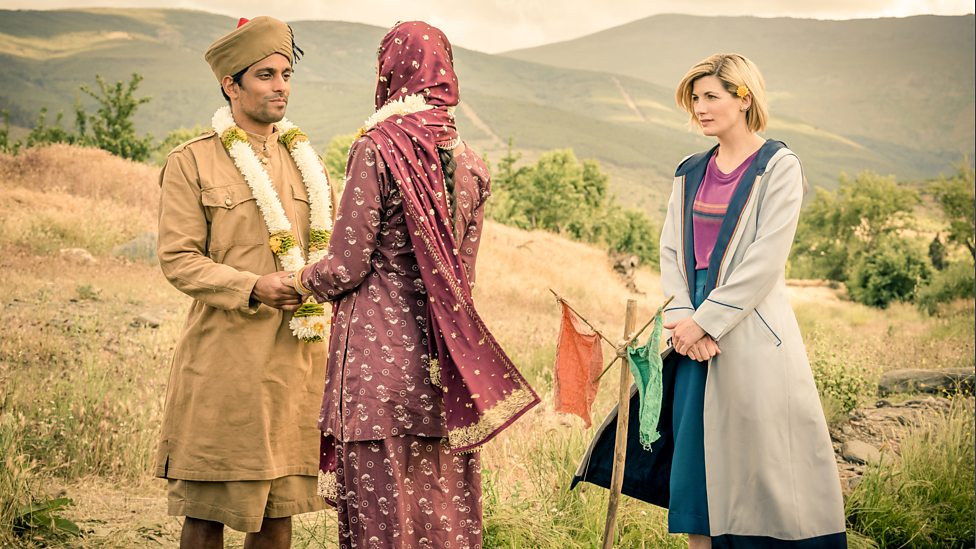It’s clear now, then, that the strongest episodes of this season of Doctor Whi are the historicals. With weaker sci-fi stories and middling modern-day adventures, this team excels when tackling more adult and complicated situations from the past. Maybe that was to be expected with Chibnall at the helm. But like “Rosa” before it, “Demons of the Punjab” is as close as NuWho has ever been to a pure historical – there are aliens here (which might point to an insistence on the part of the BBC) but they’re largely unimportant to the overall plot. This episode excels in putting the Doctor and company in the middle of an ugly historical event.
It’s 1947 in India, and the British are dividing the country. I won’t pretend to know more than I do about this, but I think the episode does an excellent job of conveying the intricacies at play here – the conflict between Hindus and Muslims, and the divisions across both land and familial lines this event led to. The Doctor herself stresses the amount of life that will be lost in the coming weeks and months, and there’s a looming sense of an oncoming storm throughout the episode. The great migration has begun, and Yaz’s family are on the dividing line.
The strength of the episode is in Yaz’s family, and not unlike “Arachnids in the UK” it’s a reminder of how great of a character Yaz is when given time to shine – she’s been the most neglected for character development this season so it’s great having an episode that pivots on her unique cultural background. It’s also apt to explore themes of identity and displacement in the modern context – Yaz’s grandmother talks of how Yorkshire may not be perfect, but it gave her a home and a family after India’s division. In the Brexit era, it’s an important reminder of the home we’ve been to those in need.
The weak point of this week is – much like “Rosa” – the aliens. Whereas that episode’s time agent was working against history following its natural curve, this week’s aliens – the Vajarians – actively avoid participating. They’ve evolved from their previous assassin ways and now bear witness to those who die unwatched and alone. It’s an iffy concept but airing on Remembrance Day offered it some more heft, considering much of that day is about silent but respectful attention to those we lost in both World Wars. This episode aired on the hundredth anniversary of the end of WW1, a fun fact for future generations.
Production quality is high as ever this week, and it’s evident once more that episodes are being filmed ‘on-location’ – this week in Spain – rather than a studio or disused coal mine. Chibnall’s writing style is established by now: we have scenes of character dialogue, the scenes of the story, and rarely do the two seem to flow into or directly follow one another. We jump from the house to the woods and these feel like distinct scenes with points to make, rather than continual flowing narratives. Likewise, Chibnall’s Doctor Who simply doesn’t act like a single, continuous narrative throughout the season.
Moffat had a tendency to overindulge in continuity and Russell T Davies made clear a ‘backbone’ to each season, but Chibnall clearly sees each adventure as its own story, like tuning into a Saturday morning cartoon. That’s not necessarily a bad thing, but Doctor Who has always had slow-burning character development and recurring themes or motifs. Aside from recognising these characters week to week, they’ve often felt like clean slates aside from their defining characteristics each time we see them. 13 still feels somewhat underdeveloped, and I find myself wishing they’d lean into how different and unique 13 is – we’ve not had the moment yet where companions realise the Doctor has had many faces before, and there’s so much potential there.
It was fantastic when Yaz’s grandmother divides the men and women of the group for the pre-wedding activities, and the Doctor (naturally) is sorted with the women. This is, quite literally, a new and unique situation that the Doctor could never have been involved in or present for before. Femininity is not a weaker version of masculinity and I hope going forward that the writers team realise 13 is capable of being many things she simply hasn’t been before. She’s still the Doctor but the fact that she’s a young woman and not an old Scotsman should open up much more narrative opportunities than it currently does. This story is only possible in the context of Yaz’s family history and likewise, we should be seeing stories that only the 13th Doctor could exist within.
“Demons of the Punjab” is either the first or second best episode of the season so far – it’s rooted in history like “Rosa”, but without the bland alien threat. It’s about real, complicated human misery and it highlights that the Doctor can’t fix everything that goes wrong. There are strong performances throughout. Both Shane Zaza and Amita Suman will make you wish their characters could stick around, and the altered closing theme is a treat. This is great television but the ‘faults’ are now apparent: you either like Chibnall’s Doctor Who or you don’t, but it’s a different beast altogether than it’s been for the last 11 years.
Some of the coverage you find on Cultured Vultures contains affiliate links, which provide us with small commissions based on purchases made from visiting our site.

